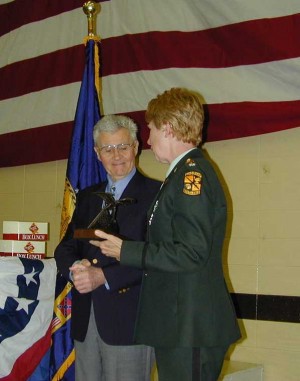There are really no words to describe what one goes through each time he hits the air, but each time it leaves its mark, its sear, and God Himself only knows the price eventually to be paid.
 General Paul W. Tibbets, the pilot of the B-29 bomber Enola Gay that dropped the 1st atomic bomb on Hiroshima was the speaker at my Roswell Rotary Club in 2002. He would be the featured guest a few days later at our big Memorial Day Celebration in Roswell, GA. During his address to us he offered, without being questioned, that he was often asked whether or not he had regrets. He said he would always answer, “No, I was doing my job.”
General Paul W. Tibbets, the pilot of the B-29 bomber Enola Gay that dropped the 1st atomic bomb on Hiroshima was the speaker at my Roswell Rotary Club in 2002. He would be the featured guest a few days later at our big Memorial Day Celebration in Roswell, GA. During his address to us he offered, without being questioned, that he was often asked whether or not he had regrets. He said he would always answer, “No, I was doing my job.”
One of our World War II Veterans raised his hand and spoke, “General Tibbets, I want you to know that you probably saved my life. I was part of a unit that would have soon been ordered to invade Japan. So, thank you sir.”
Jack Myers wrote in his book that “Bombardiers especially were prone to intense feelings of guilt.”
I wish I knew what Herman was feeling through the years that followed. On their combat missions, these airmen had to know the odds were stacked against them, and that on every mission it was likely that they or their friends would not return. They were all doing their jobs, what they had been trained to do, what they had been ordered to do. On the B-17, each crew member had critical responsibilities, but it was always the bombardier who pushed that button to drop the bombs. Jack Myers wrote in his book that “Bombardiers especially were prone to intense feelings of guilt.” And there was always the whiskey after each flight.
Herman, in his missions diary, which was written as letters to his brother Lou, also in the Air Corps, expressed his feelings: “I have no qualms, Lou, for it is now either we or they, and to us it is definitely ‘them’ … There are no regrets. … There are really no words to describe what one goes through each time he hits the air, but each time it leaves its mark, its sear, and God Himself only knows the price eventually to be paid.”
In his diary Herman included this poem, interspersed between the missions. He wrote it after his 3rd mission. When I first saw the poem, I wondered why and why there. Now that I have read and reread the stories of the crew’s experiences on the bombing raids, I can see that when Herman went back to his base and had time to think, he wrote about the souls “over there” across the water who were experiencing their own Hell.
THE SOIL OF ENGLAND
I walk the soil of England,
With a firm and steady tread.
I walk the soil of England
In free security, not dread.
Overhead, beneath the tinted sky
Giant birds in endless flight
Drone onwards, stacked high,
Supreme in their might.
Over there they kneel in fear,
In the church, the home, the dell,
As their muted ears hear
The relentless drone of Hell.
They have no hope, scared souls,
They have no peace or rest.
Loved ones, now naked ghouls,
Haunt them deep in their breast.
I walk the soil of England,
With a firm and steady tread.
I walk the soil of England,
In free security, not dread.
December 14, 1943
Daddy, “Thank you, sir.”


Barbara Ann
Posted at 03:50h, 14 MarchThe poem is what got me.
Interesting you mention you wished you could know how Daddy felt. He rarely talked about the really ‘deep stuff’. We did not know enough to ask the tough questions. Like you said, he expressed himself in his poetry, and letters to Lou.
STEVE PERRI
Posted at 14:41h, 11 AprilI am the Historian for the 91st. Bomb Group Memorial Assn.
Check out Geocities for Steve Perri Ball Turret Gunner.
Pat
Posted at 09:10h, 12 AprilSteve, I found your bio and enjoyed reading it. I too have always thought of the ball turret the most dangerous and definitely least comfortable spot on the bomber. Your story brings an excellent perspective. THANKS for all you’re doing to preserve the memories, Pat